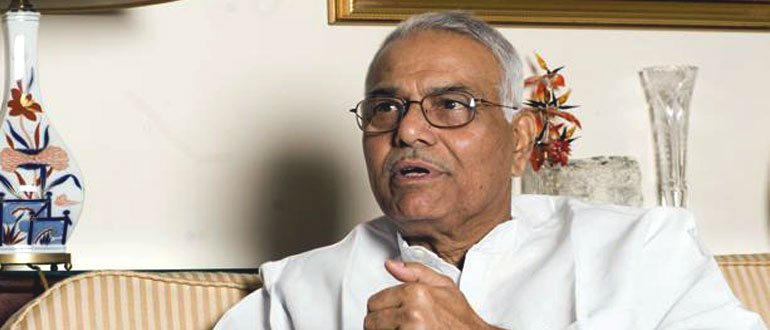New Delhi:The report filed by a high-profile delegation led by former Union minister Yashwant Sinha hasn’t really offered any fresh roadmap for resolving the prevailing political crisis in Kashmir. However, the report talks frequently about diverse voices calling for finding a political solution to the crisis, but is New Delhi willing to listen to the voices on ground, acknowledge the reality and address the issues of ordinary people living in this landlocked Valley?
The delegation, comprising of respectable Kashmir observers like Wajahat Habibullah and Sushoba Bharve, came visiting at a time when the Valley was in the midst of one of the most lethal crackdowns on freedom protests. Nearly hundred people have been killed in retaliatory action against protesters by government forces, over 12,000 protesters have been wounded — many of them blinded for life, and around 7,000 are either behind bars or detained in their homes.
Although the visit was clouded by the unceremonious binning of the report of the three-member Kashmir interlocutor group headed by Dilip Padgaonkar, which was sent by the UPA government to provide a roadmap following the civilian uprising in 2010, the fact that there wasn’t much hope in the new delegation provided the members an opportunity to meet with the cross-sections of society.
After a failed attempt by the all-party parliamentary delegation, the Sinha-led team managed to break the ice with the Hurriyat that is spearheading the agitation in the Valley, and held two meetings on as many days with the separatist leaders, Syed Ali Geelani and Mirwaiz Umar Farooq; the latter was shifted overnight from a sub-jail to his Nigeen home in order to facilitate the meeting. They also met the mainstream politicians, business leaders, civil society and ordinary people on the streets.
In a curt six-page report, the group has written to the Central government that people of Kashmir believe that “Indian politics has taken such a turn (today) that there is no willingness to listen to even demands for autonomy… In terms of the agenda of alliance (between PDP and BJP), a dialogue process must be initiated with all stakeholders so that peace can be restored,” the report says.
The thrust of the report is on the need of initiating a dialogue process with the stakeholders in Kashmir, including the separatists, which was also explained by Sinha, the senior BJP leader, in New Delhi on Thursday. “In our report
we registered grievances of people in Jammu and Kashmir, based on that we have also given a few suggestions to the government,” Sinha told ANI in New Delhi.
The delegation has written that “across the political spectrum, the Kashmiris we met spoke to virtually the same script about the history of the Kashmir issue. They made the point that this is the fifth generation of Kashmiris which was protesting but to no avail.” Clearly, there is anger and dejection among the people. Kashmiris have been historically betrayed. It is time to fulfil some of the promises made to them.
The human and economic toll taken by the prevailing crisis, the “excessive use of force by the security forces”, the wanton use of pellet guns, the reluctance to engage with the people and sort out their problems, once and for all, is pointed out repeatedly in the report. Similar recommendations have been made in previous committees and interlocutor reports but to no avail.
While dialogue is the only way out, it seems that the governments in the state and at the Centre are not ready yet. After a brief spell of freedom, all the Hurriyat leaders in Kashmir have been either detained in their homes or sent to jail. With the crisis far from over and relations with Pakistan at an all-time low, dialogue seems like a far-fetched option for now.
However, confusing the semblance of calm in Kashmir these days with the return of normalcy would be suicidal. The policymakers in Delhi should listen to their horses.
It is time to act, lest Kashmir slips into the chaos which may tear apart whatever connection India has with Kashmir.



